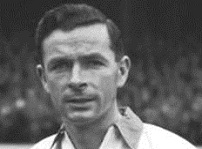|
|
|
Jimmy
Hagan |
Sheffield United FC
1 appearance, 0 goals
P 1 W 0 D 1 L 0 F
0:
A 0
50% successful
1946-48
captain: none
minutes played: 90 |
|
 |
|
Timeline |
| |
James Hagan |
|
Birth |
21 January 1918 in Washington, County Durham [registered in
Chester-le-Street, March 1918]. To Alfred and Catherine Hagan
(née Dougherty)
Attended Usworth Colliery Intermediate School,
Washington |
| |
According to Passenger Lists, James Hagan was one of numerous
professional footballers (The FA Tourists of Canada) returning to the Port
of Liverpool on 30 June 1950 from Montréal, Québec. He is aboard the
Empress of Canada. His address is stated as 71 Holleythorpe Road in
Sheffield. |
|
Death |
26 February
1998 in Sheffield, aged
80 years 36 days
[registered in Sheffield, February 1998]. |
|
Source |
 Douglas Lammings' An
English Football Internationalist Who's Who [1990] & Douglas Lammings' An
English Football Internationalist Who's Who [1990] & |
|
Biographies |
The
Jimmy Hagan Story - Roger Barnard [The History Press Limited,
2007] |
| |
Jimmy Hagan is
Sheffield United's best ever player, an inside forward who starred for the
club - and for England - in the 1940s and 1950s before going on to success
as a manager in both England and Portugal. Hagan was one of the stars of
his day and appeared in star-studded England line-ups alongside the likes
of Stanley Matthews and Tom Finney. Fans who remember watching Hagan may
now be relatively few but he remains a legend at Bramall Lane, to the
point that he actually has a statue there, unveiled by Portuguese legend
Eusebio (who Hagan coached at Benfica) in 2001. - Synopsis. |
|
Playing Career |
|
Club(s) |
Hagan gave up
the chance to attend his local grammar school because football was not
played there, and despite living between the soccer strongholds of
Newcastle and Sunderland he signed amateur forms with Liverpool FC, then
Derby County FC, with whom he turned professional in 1935. However, he
could not agree with the manager George Jobey and on 3 November 1938 he
was sold to Sheffield United for £2,500. After the conflict, when he rose to the rank of major in the Army's
Physical Training Corps. Hagan finished playing in 1958. |
|
Club honours |
x |
|
Individual honours |
x |
|
Distinctions |
Hagan's
father Alf having played for Newcastle United FC, Cardiff City FC and Tranmere
Rovers FC after the First World War. |
|
Height/Weight |
5'
8", 10st.
10lbs [1949]. |
|
Source |
Douglas Lammings' An English
Football Internationalist Who's Who [1990]. |
|
Management Career |
|
Club(s) |
"Became the manager at Peterborough
United FC in 1958. The Posh, a dominant power in the Midland League, had long deserved
elevation to Football League ranks, and they made it under Hagan in
1960. He led them to the Fourth Division title at their first attempt,
notching a League record of 134 goals that still stands today. Creditable
consolidation in the Third followed, but Hagan was sacked in October 1962
after a bitter dispute with players. In April 1963 he took over at First Division West Bromwich
Albion, and assembled an enterprising side which in 1965-66
finished sixth in the First Division and won the League Cup in a
two-legged final against West Ham United FC. However, after Albion lost the
1966-67 final to Third Division Queen's Park Rangers, he was
dismissed. There followed spells of working in a driving school and scouting
for Manchester City before Hagan embarked on his greatest challenge.
Benfica, one of the world's leading clubs, had hit a slump and wanted
a tough English taskmaster and organiser. After being turned down by
Sir Alf Ramsey, in March 1970 they astonished many observers by
turning to Hagan. Typically, he left after a dispute in 1973,
going on to coach in Kuwait for two years before completing his career in
Portugal." |
|
England Career |
|
Player number |
One of three
who became 672nd players (673) to appear
for England. |
|
Position(s) |
Inside-right |
|
Only match |
No. 241, 26 September 1948, Denmark 0 England
0, a friendly match at Idrætsparken, København, aged 30 years
249 days. |
|
Major tournaments |
None |
|
Team honours |
None |
|
Individual honours |
England B (one appearance, 1947) |
|
Distinctions |
Died seven days
after George Male |
|
Beyond England |
|
x. -
An English Football Internationalists' Who's Who.
Douglas Lamming (1990). Hatton Press, p.x. |
|
The Numbers |
|
parties |
Appearances |
unused/
reserve |
minutes |
 |
captain |
|
4 |
1 |
four |
90 |
0 |
none |
|
minutes are an approximation, due to the fact that many matches rarely stick to exactly ninety minutes long, allowing time for injuries and errors. |
|
P |
W |
D |
L |
F |
A |
GD |
FTS
|
CS |
FAv |
AAv |
Pts% |
W/L |
|
1 |
0 |
1 |
0 |
0 |
0 |
=0 |
1 |
1 |
0.00 |
0.00 |
50.0 |
=0 |
|
His only match was played at an away venue, it was a friendly
match and played in a white shirt |
Match
History
|
Club:
Sheffield United F.C. -
one full appearance (90 min) |
manager: Walter
Winterbottom - one full appearance (90
min)
|
|
apps |
match |
pic |
match details |
comp |
res. |
rundown |
shirt |
|
|